Apply now to join our next cohort of Community Science Fellows and Community Leads!
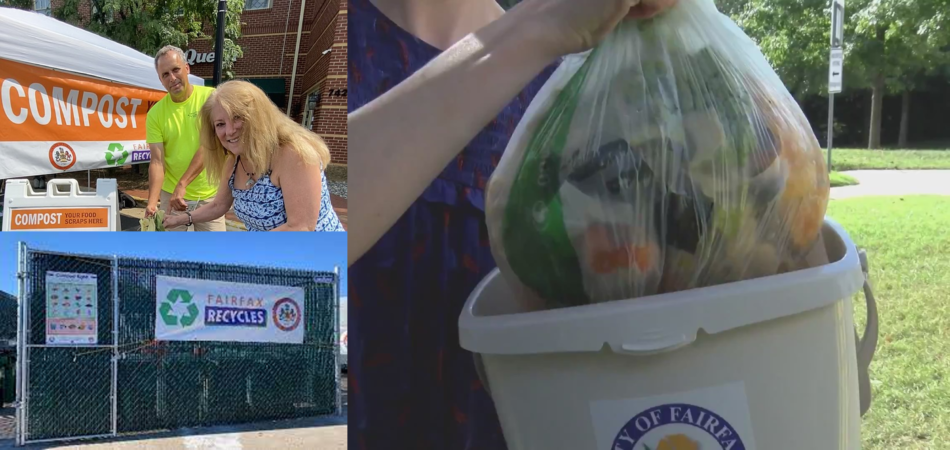
Image courtesy of the Faith Alliance for Climate Solutions (FACS)
Northern Virginians generated 2.7 million tons of municipal solid waste (MSW) in 2018, of which 35% was recycled, 11% was yard waste, and 54% was incinerated (31%) or landfilled (23%).
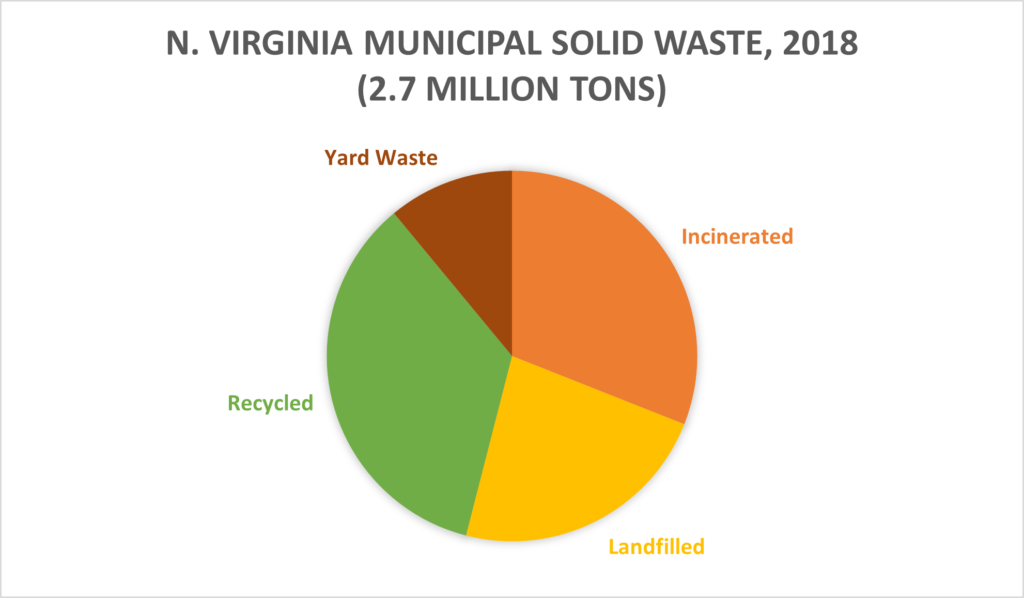
Of Fairfax’s 1.1 million tons of MSW, over 600,000 tons were incinerated at a waste to energy (WTE) plant. Fairfax currently uses single-stream recycling where all types of recyclable waste are collected in one bin and sorted at a specialized facility. A substantial portion (29%) of recycled waste is considered “contaminated” and is incinerated. Single use plastic bags are ubiquitous and only 1 percent are recycled. Over 60 percent of the litter collected in the county is single use plastic. Fairfax has an exceedingly small curbside organic waste recycling pilot. As much as a quarter of MSW that is trucked to the WTE facility for incineration is organic waste which could be separated and composted. The WTE facility processes around 3,000 tons of solid waste per day, generates 80 megawatts of electricity and emits over 1 million tons of CO2eq annually. The county has MSW management plans, but no strategy for dramatically reducing the amount of MSW.
Local nonprofit Faith Alliance for Climate Solutions (FACS) is pressing the county to commit to a zero-waste goal, increase recycling, expand organic waste recycling, divert reusable waste, and drastically cutting residual MSW that is burned or landfilled.
This project aims to reduce greenhouse gas emissions in Fairfax County linked to municipal solid waste. Analysis for this project focuses specifically on food waste, thanks in part to project scientist Dr. Dora López de Alonzo’s preliminary assessment of the County’s Zero Waste plan. Project scientist Stacy Yike will quantify the sources, pathways, and greenhouse gas emissions of food waste in Fairfax County and recommend Fairfax-specific interventions. Communications expert Dr. Julia Fine will develop an evidence-backed advocacy strategy for FACS to follow as they work to get interventions adopted in the county.
Project Impacts
Beneficiaries include all County residents. By understanding food waste sources and impacts, policies and advocacy efforts can be designed for maximum impact and help get the County closer to the goal of zero waste. Eliminating waste will preserve resources needed for future generations, reduce the health risks from incineration, and help mitigate global climate change through a reduction of greenhouse gases.
Project Outputs
Outputs include a report characterizing and quantifying Fairfax food waste volumes and associated greenhouse gas emissions, including recommended intervention strategies and targets. A second report will describe recommended, evidence-backed communication strategies for FACS to follow when advocating for suggested interventions.
Timeline
Fall 2022 (anticipated): Final reports and advocacy materials delivered to FACS
Spring-Summer 2022: Food waste sources, pathways, and greenhouse gas emissions quantified by project scientist Stacy Yike. Literature review of best fitting advocacy strategies compiled by project communications expert Julia Fine.
Winter 2021: Secondary scientist match and rescoping completed
Fall 2021: Fairfax county Energy and Climate Action Plan released and preliminary assessment county opportunities identified by project scientist Dora López de Alonzo
Summer 2021: Initial scientist match and scoping completed
Fall 2021: Project scoping began
Northern Virginia, Fairfax County borders both the City of Alexandria and Arlington County and forms part of the suburban ring of Washington, D.C. The county is predominantly suburban in character, with several high-density urban areas. In 2019, the population was estimated at 1,147,532, making it the Commonwealth’s most populous jurisdiction, with around 13% of Virginia’s population. One in seven Northern Virginia households have severe housing problems. The Robert Wood Johnson Foundation’s county health rankings identifies “islands of disadvantage” where residents, disproportionately people of color, face poverty, poor education, unaffordable housing, and lack of health insurance.
Faith Alliance for Climate Solutions (FACS) is a non-profit working towards local solutions to the climate crisis (faithforclimate.org). From its start in a single congregation in 2012, FACS has grown to more than 80 congregations across Fairfax and Northern Virginia, including Catholic, Hindu, Muslim, mainline and evangelical Protestant, Jewish, Sikh, Friends, Unitarian Universalist, and Buddhists congregations, as well as people unaffiliated with specific faith traditions. FACS organizes advocacy teams that meet regularly with their Supervisor, School Board member, and state legislators on environmental justice issues.
FACS advocacy teams have raised concerns about air pollution and health effects of trash incineration and have met with community neighborhood association groups, school parent teacher associations, environmental groups, local and state elected officials, and County staff to discuss the issue. FACS has also sponsored public forums, focusing on incineration and overall waste management. In our recently published toolkit, 2021 Fairfax to Zero: Advocating for a just, sustainable future, FACS details 10 ways to reduce the County’s waste stream.
Supplementing this project work, FACS acquired pro-bono legal support through the ABA-SEER/Thriving Earth Exchange partnership to develop a legal brief on the use of public rights away for the installation of solar or other renewable energy. The purpose of the brief is to provide guidance for public and private entities.
The legal brief will examine the legal and regulatory environment for installing and maintaining solar or other renewable energy facilities on Virginia state and Fairfax county roadway rights of way, and utility rights of way such as oil and gas pipelines and high voltage utility lines.
Foundational questions are (1) what entity owns the rights of way and (2) what entity can allow or deny renewable energy installation.
If renewable energy can be installed, what entities are permitted to own the installations? For example, rights of way under high voltage lines may be owned by the electric utility? Might that ownership preclude entities other than the utility from constructing and owning solar installations.
Are there pre-existing deed, covenant or zoning restrictions that would prohibit or inhibit solar installations? For example, might there be county zoning rules that would not allow installation of solar on rights of way.
Can independent third parties, including Sub S corporations, construct, own and maintain solar fields in rights of way?
These questions are currently being investigated with this projects ABA-SEER partners.
Dr. Eric Goplerud – Chairperson, Faith Alliance for Climate solutions
Dr. Eric Goplerud is a clinical psychologist, and Vice President and Senior Fellow at NORC at the University of Chicago. A longtime member of the Unitarian Universalist Congregation of Fairfax, Eric has been involved in interfaith social justice efforts to end homelessness in Fairfax County and developing local solutions to climate change. His career and his advocacy stem from a common motivation: to bring people together to solve problems that most severely impact people who are poor, disadvantaged and vulnerable.
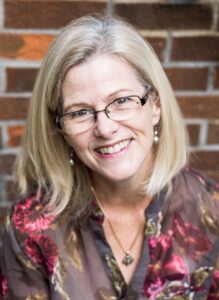
Stacy Yike is an Environmental Science and Policy graduate student at George Mason University. She studies energy consumption and waste disposition patterns in the local area. She is currently working on Fairfax County waste challenges, how waste impacts our environment, and what individual residents can do about it. Her professional background includes a 20-year military career and strategic problem solving with local government and non-profits. Stacy holds a B.S. in Mechanical Engineering from Clemson University and three Masters degrees in varying disciplines.
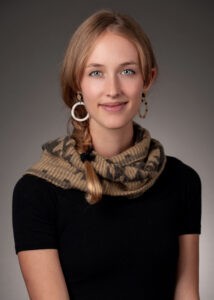
Dr. Julia Fine is a postdoctoral fellow in Environmental Studies at the College of St. Benedict & St. John’s University. Her work focuses on conversational strategies of climate justice organizing. In addition, she is a volunteer research assistant working on how to reduce waste in Fairfax County.
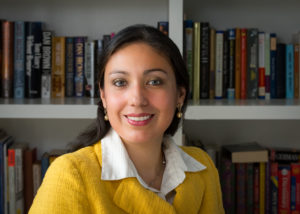
Dr. Dora López de Alonzo – Principal Engineer, MITRE
Dora Lopez de Alonzo is a Principal Engineer at MITRE. She has 20 years of experiences in energy and sustainability. Her professional background includes work with academia, private sector, Government, and non-profits. In addition, Dora is the founder of Latinoamerica Renovable, a consulting company dedicated to creating awareness of renewable energies in Latin America. Dora holds a B.S. in Chemical Engineering from Universidad Centroamericana and a PhD in chemical engineering from Clemson University, where she also completed post-doctoral work.
(2021-Present)
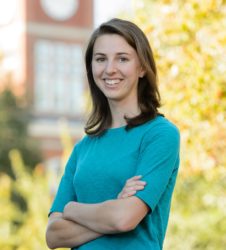
Dr. Lisa Watkins studies plastic in rivers and on city streets, focused on how scientists and community members can better measure it. Her background also includes work on flooding prevention, riparian buffers, and using GIS to map at-risk populations living near oil & gas wells. Lisa holds a M.S. and a Ph.D. in environmental & biological engineering from Cornell University and a B.S. in environmental engineering from Clemson University.
(2020-2021)
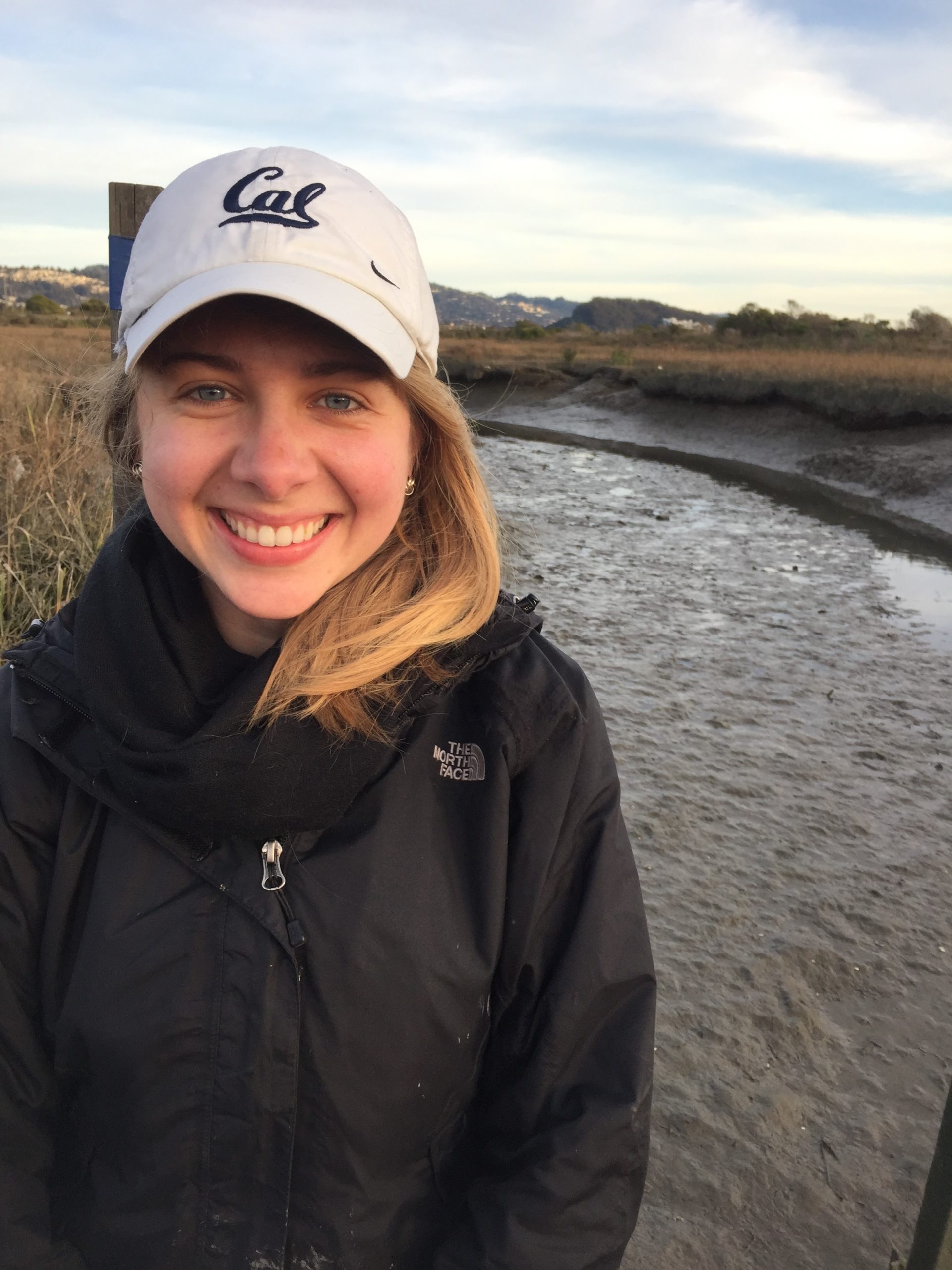
Maddie Foster-Martinez is a postdoctoral research associate with the Pontchartrain Institute for Environmental Sciences at the University of New Orleans. She studies wetland processes through field measurements and modeling and works to connect cutting-edge science with restoration designs and land management decisions. She is currently working on multiple coastal protection projects, including the Louisiana Coastal Master Plan, and teaching a virtual oceanography school in Ghana. As a New Orleans native, her passion for all things Louisiana drives her work and play. Maddie holds a BE from the Cooper Union and an MS and PhD from UC Berkeley.
This project is supported by funding from the Gordon and Betty Moore Foundation.
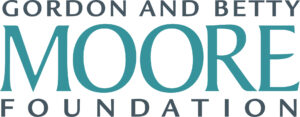
OFFICIAL COMMUNITY SOLAR MEMORANDUM.docx Download
(c) 2024 Thriving Earth Exchange